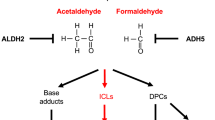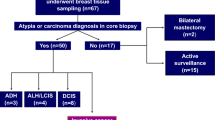Abstract
Chromosomal instability is a known hallmark of many cancers. DNA polymerases represent a group of enzymes that are involved in the mechanism of chromosomal instability as they have a central function in DNA metabolism. We hypothesized that genetic variation in the polymerase genes may affect gene expression or protein configuration and by that cancer risk and clinical outcome. We selected four genes encoding for the catalytic subunits of the polymerases β, δ, θ and ζ (POLB, POLD1, POLQ and REV3L, respectively) and two associated proteins (MAD2L2 and REV1) because of their previously reported association with chromosomal instability and/or tumorigenesis. We selected potentially functional and most informative tagging single nucleotide polymorphisms (SNPs) for genotyping in a population-based series of 783 Swedish breast cancer (BC) cases and 1562 controls. SNPs that showed a significant association in the Swedish population were additionally genotyped in a Polish population consisting of 506 familial/early onset BC cases and 568 controls. SNPs in all three polymerase ζ subunit genes associated either with BC risk or prognosis. Two SNPs in REV3L and one SNP in MAD2L2 associated with BC risk: rs462779 (multiplicative model: OR 0.79, 95% CI 0.68–0.92), rs3204953 (dominant model: OR 1.28, 95% CI 1.05–1.56) and rs2233004 (recessive model: OR 0.49, 95% CI 0.28–0.86). Homozygous carriers of the minor allele C of the third SNP in REV3L, rs11153292, had significantly worse survival compared to the TT genotype carriers (HR 2.93, 95% CI 1.34–6.44). Minor allele carriers of two REV1 SNPs (rs6761391 and rs3792142) had significantly more often large tumours and tumours with high histological grade and stage. No association was observed for SNPs in POLB, POLQ and POLD1. Altogether, our data suggest a significant role of genetic variation in the polymerase ζ subunit genes regarding the development and progression of BC.

Similar content being viewed by others
References
Caldecott KW (2008) Single-strand break repair and genetic disease. Nat Rev Genet 9(8):619–631
Friedberg EC (2005) Suffering in silence: the tolerance of DNA damage. Nat Rev Mol Cell Biol 6(12):943–953
Loeb LA, Monnat RJ Jr (2008) DNA polymerases and human disease. Nat Rev Genet 9(8):594–604
Sweasy JB, Lauper JM, Eckert KA (2006) DNA polymerases and human diseases. Radiat Res 166(5):693–714
Hubscher U, Maga G, Spadari S (2002) Eukaryotic DNA polymerases. Annu Rev Biochem 71:133–163
Wittschieben JP, Reshmi SC, Gollin SM, Wood RD (2006) Loss of DNA polymerase zeta causes chromosomal instability in mammalian cells. Cancer Res 66(1):134–142
Albertella MR, Lau A, O’Connor MJ (2005) The overexpression of specialized DNA polymerases in cancer. DNA Repair (Amst) 4(5):583–593
Brondello JM, Pillaire MJ, Rodriguez C, Gourraud PA, Selves J, Cazaux C, Piette J (2008) Novel evidences for a tumor suppressor role of Rev3, the catalytic subunit of Pol zeta. Oncogene 27(47):6093–6101
Carter SL, Eklund AC, Kohane IS, Harris LN, Szallasi Z (2006) A signature of chromosomal instability inferred from gene expression profiles predicts clinical outcome in multiple human cancers. Nat Genet 38(9):1043–1048
Habermann JK, Doering J, Hautaniemi S, Roblick UJ, Bundgen NK, Nicorici D, Kronenwett U, Rathnagiriswaran S, Mettu RK, Ma Y, Kruger S, Bruch HP, Auer G, Guo NL, Ried T (2009) The gene expression signature of genomic instability in breast cancer is an independent predictor of clinical outcome. Int J Cancer 124(7):1552–1564
Rajagopalan H, Lengauer C (2004) Aneuploidy and cancer. Nature 432(7015):338–341
Kawamura K, Bahar R, Seimiya M, Chiyo M, Wada A, Okada S, Hatano M, Tokuhisa T, Kimura H, Watanabe S, Honda I, Sakiyama S, Tagawa M, OW J (2004) DNA polymerase theta is preferentially expressed in lymphoid tissues and upregulated in human cancers. Int J Cancer 109(1):9–16
Srivastava DK, Husain I, Arteaga CL, Wilson SH (1999) DNA polymerase beta expression differences in selected human tumors and cell lines. Carcinogenesis 20(6):1049–1054
Szuts D, Marcus AP, Himoto M, Iwai S, Sale JE (2008) REV1 restrains DNA polymerase zeta to ensure frame fidelity during translesion synthesis of UV photoproducts in vivo. Nucleic Acids Res 36(21):6767–6780
Kaaks R, Lundin E, Rinaldi S, Manjer J, Biessy C, Soderberg S, Lenner P, Janzon L, Riboli E, Berglund G, Hallmans G (2002) Prospective study of IGF-I, IGF-binding proteins, and breast cancer risk, in northern and southern Sweden. Cancer Causes Control 13(4):307–316
Brendle A, Brandt A, Johansson R, Enquist K, Hallmans G, Hemminki K, Lenner P, Forsti A (2009) Single nucleotide polymorphisms in chromosomal instability genes and risk and clinical outcome of breast cancer: a Swedish prospective case-control study. Eur J Cancer 45(3):435–442
Varadi V, Brendle A, Brandt A, Johansson R, Enquist K, Henriksson R, Svenson U, Tavelin B, Roos G, Hemminki K, Lenner P, Forsti A (2009) Polymorphisms in telomere-associated genes, breast cancer susceptibility and prognosis. Eur J Cancer 45(17):3008–3016
Vaclavicek A, Bermejo JL, Wappenschmidt B, Meindl A, Sutter C, Schmutzler RK, Kiechle M, Bugert P, Burwinkel B, Bartram CR, Hemminki K, Forsti A (2007) Genetic variation in the major mitotic checkpoint genes does not affect familial breast cancer risk. Breast Cancer Res Treat 106(2):205–213
Ng PC, Henikoff S (2003) SIFT: predicting amino acid changes that affect protein function. Nucleic Acids Res 31(13):3812–3814
Ng PC, Henikoff S (2001) Predicting deleterious amino acid substitutions. Genome Res 11(5):863–874
Barrett JC, Fry B, Maller J, Daly MJ (2005) Haploview: analysis and visualization of LD and haplotype maps. Bioinformatics 21:263–265
Negrini S, Gorgoulis VG, Halazonetis TD (2010) Genomic instability—an evolving hallmark of cancer. Nat Rev Mol Cell Biol 11(3):220–228
Bachrati CZ, Hickson ID (2003) RecQ helicases: suppressors of tumorigenesis and premature aging. Biochem J 374(Pt 3):577–606
Kennedy RD, D’Andrea AD (2006) DNA repair pathways in clinical practice: lessons from pediatric cancer susceptibility syndromes. J Clin Oncol 24(23):3799–3808
Ripperger T, Gadzicki D, Meindl A, Schlegelberger B (2009) Breast cancer susceptibility: current knowledge and implications for genetic counselling. Eur J Hum Genet 17(6):722–731
Han J, Haiman C, Niu T, Guo Q, Cox DG, Willett WC, Hankinson SE, Hunter DJ (2009) Genetic variation in DNA repair pathway genes and premenopausal breast cancer risk. Breast Cancer Res Treat 115(3):613–622
Acknowledgments
We thank Asa Agren (Department of Public Health and Clinical Medicine/Nutritional Research, Umeå University, Sweden) for her efficiency and skill in keeping track of samples and data. The Northern Sweden Breast Cancer Group is appreciated for providing the clinical data.
Author information
Authors and Affiliations
Corresponding author
Electronic supplementary material
Below is the link to the electronic supplementary material.
Rights and permissions
About this article
Cite this article
Varadi, V., Bevier, M., Grzybowska, E. et al. Genetic variation in genes encoding for polymerase ζ subunits associates with breast cancer risk, tumour characteristics and survival. Breast Cancer Res Treat 129, 235–245 (2011). https://doi.org/10.1007/s10549-011-1460-z
Received:
Accepted:
Published:
Issue Date:
DOI: https://doi.org/10.1007/s10549-011-1460-z




